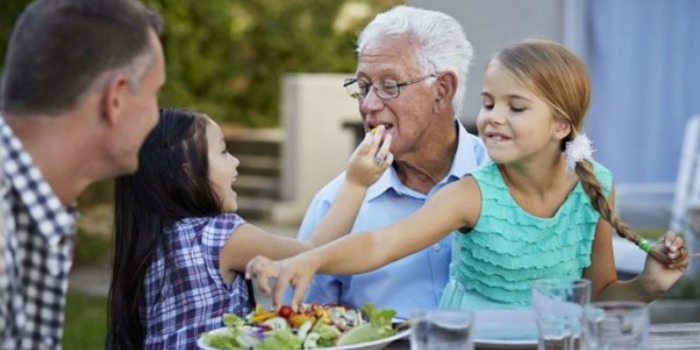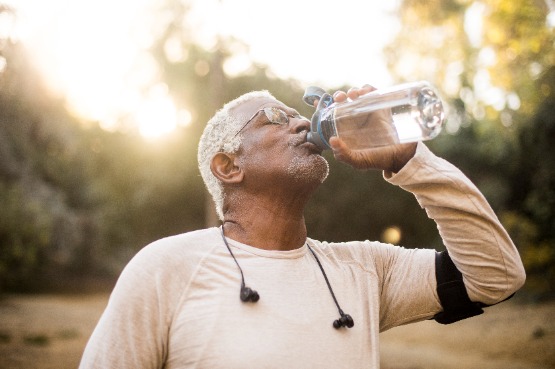Eating well during cancer: what you need to know
People with cancer have different dietary needs. Eating and drinking well will help you to cope with treatment and your recovery. Some people with cancer are able to eat and drink as normal. Others may experience problems with their eating. Here, I talk about what you can do to if you’re having problems with eating due to cancer, or cancer treatment.

Why is a healthy diet important when you have cancer?
Cancer can cause people to lose weight, even if they’re eating normally. Cancer also affects how your body uses and processes nutrients in foods. Being underweight can:
- make it hard for your body to cope with treatment
- delay your treatment if you’re not well enough
So, you need to eat well to keep your strength and energy up. Getting enough protein is also important for your muscle mass and for your immune system to fight infections.
Cancer can also cause weight gain. This may be due to cancer itself, lifestyle changes, or because of certain treatments such as hormone therapies. Its still important to eat a healthy diet. Talk to your cancer doctor or nurse if you’re worried about weight changes.
Why is it hard for cancer patients to eat?
Cancer can make eating difficult for several reasons.
- If cancer is affecting your digestive system, it might cause symptoms like nausea, vomiting, stomach pain, diarrhoea, or constipation. These symptoms can affect your appetite.
- You may feel tired, low, or in pain from cancer or your treatments. This may affect your appetite.
- You may find you don’t have the energy to buy and prepare food.
- Treatment side-effects such as feeling sick, mouth ulcers, and a dry or sore mouth can make it hard to eat and drink.
- Chemotherapy can change your sense of taste and smell, which might put you off eating.
- Radiotherapy and chemotherapy can cause digestive problems such as diarrhoea or constipation.
How do you eat well when you have cancer?
There is no specific diet for cancer patients to follow. In general, you should try to maintain a healthy, balanced diet, with food from all the main food groups.
You may need to increase the calories and protein in your diet if you’re losing weight due to cancer. This might mean following a diet with high-calorie and high-fat options. Below are tips for increasing your calorie and protein intake.
- Eat full fat options of milk, cream, cheese, yoghurts, and spreads.
- Have milky drinks such as milkshakes, lattes, hot chocolates, and creamy desserts such as yoghurt, custard, rice pudding.
- Add dried fruits, nuts and seeds to breakfast cereals or yoghurts.
- Eat high protein snacks such as sausage rolls, cheese and crackers, nuts and seeds, fromage frais, hard-boiled eggs and houmous.
- Make sure to include a form of protein (meat, fish, eggs, beans, dairy or meat alternative) at every meal.
If you’re struggling to keep to a healthy weight, talk to your doctor or nurse. They can put you in touch with a dietitian.
If you’re eating a good diet, there’s usually no need to take extra vitamins and minerals when you have cancer. But if you need a supplement, your doctor can recommend one when:
- you’re finding it hard to get enough nutrients from your food
- your absorption of nutrients has been affected by the cancer or treatment
What foods should cancer patients avoid?
If you’re losing too much weight, try to avoid foods that provide little energy or nutrients. These include low-calorie drinks, salads, and clear soups. These fill you up without giving your body the calories and protein it needs.
You might find you need to avoid certain foods because of side-effects from treatment. If you have a sore mouth, you might want to avoid spicy foods or rough textured foods such as toast and raw vegetables. If your immunity is low (for example, from high-dose chemotherapy), you may need to avoid foods that could cause infection. These include cheeses that are mould-ripened or made from unpasteurised milk, raw meats and seafood, and runny eggs. Your nurse will discuss this with you.
Check with your doctor or nurse before drinking alcohol. You’ll usually be able to drink small amounts of alcohol with most types of chemotherapy. But alcohol can interact with certain chemotherapy drugs and make you feel unwell. It can also irritate any sores in your mouth caused by cancer treatment.
Tips for eating
If you find that your cancer has affected your appetite or ability to eat, here are some tips that may help.
- If you’re tired, plan ahead by preparing meals and freezing them for later, and do your shopping online. Use convenience foods such as ready meals and tinned foods.
- If you don’t have an appetite, try to do some gentle exercise as this may make you want to eat.
- If you’re sick, avoid foods with strong smells and try bland foods instead such as crackers, or plain toast.
- If you’re constipated, make sure to eat enough fibre. Sources of fibre include fruit and vegetables, wholegrains, brown rice, and porridge.
- If you have diarrhoea, drink enough fluids. Try to aim for at least two litres daily, and avoid alcohol or coffee.
- If your tastes have changed, try adding herbs or spices to your food. You could also try eating things you previously disliked.
- If you have a sore mouth or trouble swallowing, go for foods that are soft and easy to eat. These include foods with lots of sauce such as stews, dahls, cottage pie, and fish pie.
How do you eat healthily after cancer?
You should in time be able to return to your normal diet after you’ve finished treatment for cancer. Most eating problems you may have had during treatment should improve with time.
There isn’t enough evidence for any particular diet after cancer treatment. It’s recommended that you should eat a healthy, balanced diet. It’s also important to keep to a healthy weight and get regular physical activity. Being overweight can be a risk factor for certain cancers coming back.
For some people, recovering from cancer is a good time to start thinking about diet and lifestyle. If you need to lose any excess weight, it’s important that you do so safely. Lose weight gradually and focus on both diet and increased physical activity levels. You may want to take some time to recover from your cancer before thinking about making any changes.
Your doctor, nurse or dietitian can give you more advice on staying healthy and well after cancer treatment.
Do you know how healthy you truly are? Bupa health assessments give you a clear overview of your health and a view of any future health risks. You'll receive a personal lifestyle action plan with health goals to reach for a happier, healthier you.
-
Sources Sources
- Muscaritoli M, Arends J, Bachmann P, et al. ESPEN practical guideline: clinical nutrition in cancer. Clin Nutr 2021;40(5): 2898-2913. doi: 10.1016/j.clnu.2021.02.005
- Why diet is important. Cancer Research UK. cancerresearchuk.org, last reviewed February 2020
- How cancer causes diet problems. Cancer Research UK. cancerresearchuk.org, last reviewed February 2020
- Cancer cachexia. Cancer. Oxford handbook of nutrition and dietetics (3 ed online). Oxford Academic. academic.oup.com, published April 2020. doi: 10.1093/med/9780198800132.003.0024
- Cancer treatment. Cancer. Oxford handbook of nutrition and dietetics (3 ed online). Oxford Academic. academic.oup.com, published April 2020. doi: 10.1093/med/9780198800132.003.0024
- Boosting energy and protein in everyday foods. Cancer Research UK. cancerresearchuk.org, last reviewed March 2020
- Changes in weight. Macmillan Cancer Support. macmillan.org.uk, last revied August 2020
- Weight changes. American Cancer Society. cancer.org, last revised September 2022
- How treatment causes diet problems. Cancer Research UK. cancerresearchuk.org, last reviewed March 2020
- Ligibel JA, Bohlke K, May AM, et al. Exercise, diet, and weight management during cancer treatment: ASCO Guideline. J Clin Oncol 2022. Published online 16 May 2022. doi: 10.1200/JCO.22.00687
- Living with and beyond cancer. Cancer. Oxford handbook of nutrition and dietetics (3 ed online). Oxford Academic. academic.oup.com, published April 2020. doi:10.1093/med/9780198800132.003.0024
- Managing nutritional status in cancer. Cancer. Oxford handbook of nutrition and dietetics (3 ed online). Oxford Academic. academic.oup.com, published April 2020. doi:10.1093/med/9780198800132.003.0024
- Frequently asked questions. Cancer. Oxford handbook of nutrition and dietetics (3 ed online). Oxford Academic. academic.oup.com, published April 2020. doi:10.1093/med/9780198800132.003.0024
- Vitamins, diet supplements and cancer. Cancer Research UK. about-cancer.cancerresearchuk.org, last reviewed April 2022
- Treatment of undernutrition. Nutrition support. Oxford handbook of nutrition and dietetics (3 ed online). Oxford Academic. academic.oup.com, published April 2020. doi: 10.1093/med/9780198800132.003.0025
- Tips for diet problems. Cancer Research UK. cancerresearchuk.org, last reviewed March 2020
- Neutropenia and food hygiene. Cancer. Oxford handbook of nutrition and dietetics (3 ed online). Oxford Academic. academic.oup.com, published April 2020. doi:10.1093/med/9780198800132.003.0024
- Social life, alcohol and other activities during chemotherapy. Cancer Research UK. cancerresearchuk.org, last reviewed August 2020
- Tips for managing eating problems. Macmillan Cancer Support. macmillan.org.uk, last reviewed August 2020
- Tiredness (fatigue). Macmillan Cancer Support. macmillan.org.uk, last reviewed September 2020
- Fibre: Food Fact Sheet. The Association of UK Dietitians. bda.uk.com, published April 2021
- Mouth problems. Macmillan Cancer Support. macmillan.org.uk, last reviewed August 2020
- Keaver L, Houlihan C, O'Callaghan N, et al. Evidence-based nutrition guidelines for cancer survivors in Europe: a call for action. Eur J Clin Nutr 2022;76(6): 819-826. doi: 10.1038/s41430-021-01036-8
About our health information
At Bupa we produce a wealth of free health information for you and your family. This is because we believe that trustworthy information is essential in helping you make better decisions about your health and wellbeing.
Our information has been awarded the PIF TICK for trustworthy health information. It also follows the principles of the The Information Standard.

More diet and nutrition articles
Did you find our advice helpful?
We’d love to hear what you think. Our short survey takes just a few minutes to complete and helps us to keep improving our healthy lifestyle articles.
Legal disclaimer
This information was published by Bupa's Health Content Team and is based on reputable sources of medical evidence. It has been reviewed by appropriate medical or clinical professionals and deemed accurate on the date of review. Photos are only for illustrative purposes and do not reflect every presentation of a condition.
Any information about a treatment or procedure is generic, and does not necessarily describe that treatment or procedure as delivered by Bupa or its associated providers.
The information contained on this page and in any third party websites referred to on this page is not intended nor implied to be a substitute for professional medical advice nor is it intended to be for medical diagnosis or treatment. Third party websites are not owned or controlled by Bupa and any individual may be able to access and post messages on them. Bupa is not responsible for the content or availability of these third party websites. We do not accept advertising on this page.







